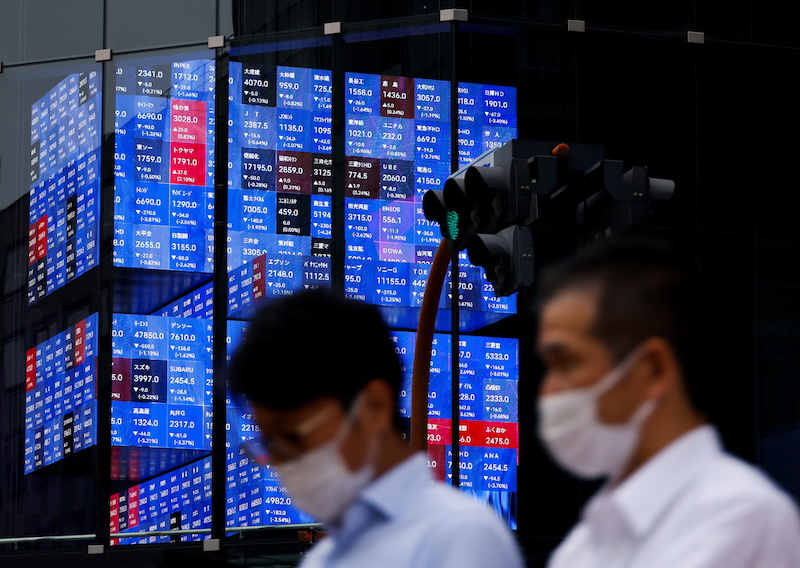Asian shares held onto last week’s gains at the start of the week with investors reassured by China’s post-Covid resurgence.
But while most traders across the region were buoyed by the recovery prospects of the world’s No2 economy after three long hard years of Covid curbs and shutdowns, investors in Japan were anxious about a soaring yen and the country’s central bank’s next move.
Japan’s Nikkei share average slumped 1%, with exporters feeling the pressure from a stronger yen as investors bet the Bank of Japan could be forced to tweak stimulus settings again as soon as this week.
Also on AF: Chinese EV Maker BYD Planning $250m Vietnam Parts Plant
The Nikkei share average was down 1.14%, or 297.20 points, to close at 25,822.32, while the broader Topix was down 0.88%, or 16.77 points, to 1,886.31.
The yen reached its strongest since May at 127.215 per dollar with speculators ramping up wagers that the BOJ’s yield curve controls are becoming untenable amid rising inflationary pressure.
The central bank sets policy on Wednesday, after shocking markets last month by doubling the band that it lets the 10-year Japanese government bond yield move around zero, to a range of -0.5% to 0.5%.
The benchmark yield exceeded that target for a second day on Monday, reaching 0.51%.
The BOJ’s uber-easy policy has acted as a sort of anchor for yields globally, while dragging down on the yen. Were it to abandon the policy, it would put upward pressure on yields across developed markets and most likely see the yen surge more.
Meanwhile, mainland China stocks jumped to a four-month high, aided by strong foreign inflows, while Hong Kong shares edged up as investors doubled down their bets on economic recovery after Chinese health officials said Covid-19 infections in the country had peaked.
China’s blue-chip CSI300 Index ended the session up 1.6%, while the Shanghai Composite Index climbed 1.01%, or 32.29 points, to 3,227.59.
The Hang Seng Index gained just 0.04%, or 8.06 points, to 21,746.72 and the Shenzhen Composite Index on China’s second exchange advanced 1.35%, or 27.83 points, to 2,094.99.
Foreign Funds Grab Chinese Stocks
Net foreign buying of China-listed stocks via Stock Connect hit a two-month high of 15.4 billion yuan ($2.29 billion) on Monday.
Net buying so far this year has exceeded $9 billion as foreign funds snap up Chinese financials and consumer stocks, according to Goldman Sachs.
China also reported a sharp rise in travel ahead of the Lunar New Year holiday while the Chinese gambling hub of Macau expected a Spring Festival boom in tourism.
“Stars are aligning for a China/HK rebound in 2023 after a torrid 2022,” DBS wrote. “It won’t be a smooth ride. But 4Q22-1Q23 is likely the cyclical trough, in our view.”
Indian stocks retreated with Mumbai’s signature Nifty 50 index down 0.36%, or 64.95 points, at 17,891.65.
MSCI’s broadest index of Asia-Pacific shares outside Japan added 0.9%, with hopes for a speedy Chinese reopening giving it a gain of 4.2% last week.
Dollar Falls to 8-Month Low
Earnings season gathers steam this week with Goldman Sachs, Morgan Stanley and the first big tech name, Netflix, among those reporting.
World leaders, policy makers and top corporate chiefs will be attending the World Economic Forum in Davos, and there are a host of central bankers speaking, including no fewer than nine members of the US Federal Reserve.
They meet with the dollar at its lowest since May at 127.22 yen, having shed 3.2% last week.
The dollar has been undermined by falling US bond yields as markets wager the Federal Reserve can be less aggressive in raising rates given inflation has clearly turned the corner.
Futures now imply almost no chance the Fed will raise rates by half a point in February, with a quarter-point move seen as a 94% probability.
Yields on 10-year Treasuries are down at 3.51%, having fallen 6 basis points last week, close to its December trough, and major chart target of 3.402%.
The drop in yields and the dollar has benefited gold, which jumped 2.9% last week and was trading at the highest since April at $1,927 an ounce.
Oil prices also rallied last week on hopes the speedy reopening of China would boost demand. Data on mobility, traffic and transport trips in China have shown a sharp revival ahead of the Lunar New Year holidays next week.
But Chinese data on economic growth, retail sales and industrial output due this week are certain to be dismal, though markets will likely look past that to a rapid recovery now coronavirus restrictions have been dropped.
Key figures
Tokyo – Nikkei 225 < DOWN 1.14% at 25,822.32 (close)
Hong Kong – Hang Seng Index > UP 0.04% at 21,746.72 (close)
Shanghai – Composite > UP 1.01% at 3,227.59 (close)
London – FTSE 100 > UP 0.13% at 7,854.29 (0935 GMT)
New York – Dow > UP 0.33% at 34,302.61 (Friday close)
- Reuters with additional editing by Sean O’Meara
Read more:
Yen Jumps on Talk of BOJ Shift, Dollar Drops to 7-Month Low
UK Asset Manager Schroders Gets China Fund Unit Green Light
Chinese Citizens Begin Vast Travel Migration Amid Covid Concerns























